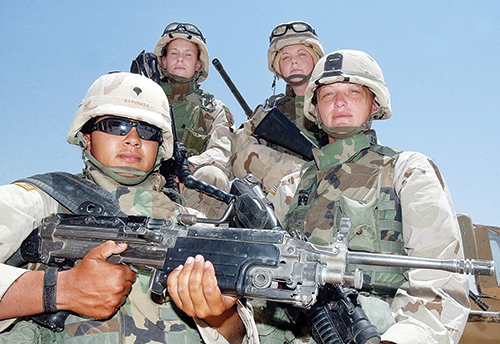
It’s still strange to realize that the war in Iraq has become, for the most part, a thing of the past. For years now, people on both sides of the political aisle have admitted it was largely a mistake, a war that began under false pretenses.
These same people have rallied to support the troops, who had no say in fighting it. But not all troops are created equally, which is part of the focus of Meg McLagan and Daria Sommers’ 2008 documentary, Lioness, about a unit of female soldiers called Team Lioness who served in frontline missions in Iraq.
The Women Veterans Outreach Action Team is screening Lioness on campus this evening and will hold a discussion following the film.
Though they face enormous struggles, veterans of Iraq are not viewed the same way Vietnam vets were when they returned home. It’s a credit to America that these returning Iraq vets have received much kinder treatment. I know I certainly have respect and admiration for a soldier’s ability to do things I could never imagine doing and face situations most of us will never face—especially female soldiers.
I think many of us can also relate to common reasons a young person has for joining the military, some of which are outlined in the film, such as earning money for college or learning valuable life skills. So it’s ironic that one of the initial barriers to Lioness is how difficult the women are to relate to, probably for many of us.
I don’t say this as a criticism, just as a larger issue the film might inspire you to consider. When the film opens, we meet Spc. Shannon Morgan, a member of Team Lioness who hunts squirrels in rural Arkansas and declares that she doesn’t watch the news.
We see Capt. Anastasia Breslow’s father, a veteran himself, spout off about Al Gore and state, in a rather chilling way, that he’s willing to accept the risks of having both children in the military.
None of the five women profiled in the documentary, which also features Spc. Rebecca Nava, Maj. Kate Guttormsen and Staff Sgt. Ranie Ruthig, are women you would necessarily know. They might not be women you would necessarily like. And they’re more than likely women you can’t understand, not least because it’s impossible to understand what war is like unless you’ve been in one.
So it might surprise you, like it did me, that McLagan and Sommers are both New York-based filmmakers with no military background. They were simply fascinated by the changing face of the female soldier and the complicated reality that these women were serving on combat missions for all the wrong reasons, without the same training the men received and in ways that both the military and the media disregard.
A 1994 policy called the “risk rule” bans female soldiers from participating in direct combat missions, which one can only assume was a reaction to the influx of women entering the military since the first Gulf War and the military’s inability to deal with a changing reality.
In the Iraq war, the definition of a combat mission was slightly different. In Ramadi, Iraq, the military soon discovered that with soldiers searching towns and individual homes of civilians, sometimes in the dead of night, females were often needed to calm down civilians and to interact with and search Islamic women in a way male soldiers couldn’t.
These searches resulted in valuable information and captures, and it placed the women of Team Lioness—who began as mechanics, supply clerks and signal workers—in incredibly scary and dangerous situations.
It was a temporary arrangement to get around violating the risk rule, and many of the male soldiers had no idea how little training the women had had. Many of the male soldiers didn’t even know the policy against women in combat existed.
The strength of Lioness lies in the powerful stories of these five women, often told from their own diary entries. These women might be different from us and different from each other, but their emotional accounts of the reality of war feel universal.
They talk about their conflicting feelings regarding the Iraqi civilians and the women and children of Ramadi, how it feels to kill people and how it feels to see people die. Guttormsen speaks eloquently about how female soldiers deal with the emotions of war much better than men do.
There’s another side to the story of Team Lioness, and that involves the deliberate caginess of the military regarding the discrepancy between these women’s official jobs and what they were actually asked to do.
One of the most powerful scenes involves the women reuniting to watch an Iraq documentary on the History Channel. Even the commercials seem to be selling a male fantasy of war. Soldiers are repeatedly referred to as “the men.” And yet the documentary depicts actual missions on which several of the women served.
Lioness is the fascinating story of how even the bravest of our fighting women are still fighting to be treated fairly.

